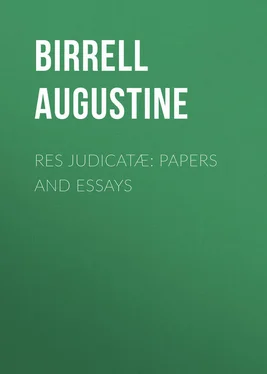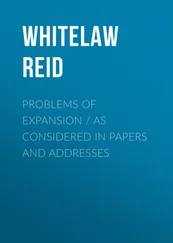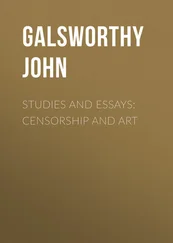Augustine Birrell - Res Judicatæ - Papers and Essays
Здесь есть возможность читать онлайн «Augustine Birrell - Res Judicatæ - Papers and Essays» — ознакомительный отрывок электронной книги совершенно бесплатно, а после прочтения отрывка купить полную версию. В некоторых случаях можно слушать аудио, скачать через торрент в формате fb2 и присутствует краткое содержание. Жанр: foreign_antique, foreign_prose, Историческая проза, на английском языке. Описание произведения, (предисловие) а так же отзывы посетителей доступны на портале библиотеки ЛибКат.
- Название:Res Judicatæ: Papers and Essays
- Автор:
- Жанр:
- Год:неизвестен
- ISBN:нет данных
- Рейтинг книги:3 / 5. Голосов: 1
-
Избранное:Добавить в избранное
- Отзывы:
-
Ваша оценка:
- 60
- 1
- 2
- 3
- 4
- 5
Res Judicatæ: Papers and Essays: краткое содержание, описание и аннотация
Предлагаем к чтению аннотацию, описание, краткое содержание или предисловие (зависит от того, что написал сам автор книги «Res Judicatæ: Papers and Essays»). Если вы не нашли необходимую информацию о книге — напишите в комментариях, мы постараемся отыскать её.
Res Judicatæ: Papers and Essays — читать онлайн ознакомительный отрывок
Ниже представлен текст книги, разбитый по страницам. Система сохранения места последней прочитанной страницы, позволяет с удобством читать онлайн бесплатно книгу «Res Judicatæ: Papers and Essays», без необходимости каждый раз заново искать на чём Вы остановились. Поставьте закладку, и сможете в любой момент перейти на страницу, на которой закончили чтение.
Интервал:
Закладка:
Having written Clarissa it became inevitable that Richardson should proceed further and write Grandison . In reading his correspondence we hail Sir Charles afar off. Richardson had deeply grieved to see how many of his ladies had fallen in love with the scoundrelly Lovelace. It wounded him to the quick, for he could not but feel that he was not in the least like Lovelace himself. He turns almost savagely upon some of his fair correspondents and upbraids them, telling them indeed plainly that he feared they were no better than they should be. They had but one answer: 'Ah, dear Mr. Richardson, in Clarissa you have shown us the good woman we all would be. Now show us the good man we all should love.' And he set about doing so seriously, aye and humbly, too. He writes with a sad sincerity a hundred years cannot hide:
'How shall a man obscurely situated, never in his life delighting in public entertainments, nor in his youth able to frequent them from narrowness of fortune; one of the most attentive of men to the calls of business – his situation for many years producing little but prospects of a numerous family – a business that seldom called him abroad when he might in the course of it see and know a little of the world, as some employments give opportunities to do – naturally shy and sheepish, and wanting more encouragement by smiles to draw him out than anybody thought it worth their while to give him – and blest (in this he will say blest) with a mind that set him above dependence, and making an absolute reliance on Providence and his own endeavours – how I say, shall such a man pretend to describe and enter into characters in upper life?'
However, he set about it, and in 1754 produced Sir Charles Grandison , or as he had originally intended to call it, the Good Man , in six octavo volumes.
I am not going to say he entirely succeeded with his good man, who I know has been called an odious prig. I have read Sir Charles Grandison once – I cannot promise ever to read it again, and yet who knows what may happen? Sir Walter Scott, in his delightful, good-humoured fashion, tells a tale of a venerable lady of his acquaintance, who, when she became subject to drowsy fits, chose to have Sir Charles read to her as she sat in her elbow chair in preference to any other work; because, said she, 'should I drop asleep in the course of the reading, I am sure when I awake I shall have lost none of the story, but shall find the party where I left them, conversing in the cedar-parlour.'
After Sir Charles , Richardson wrote no more. Indeed, there was nothing to write about, unless he had taken the advice of a morose clerical friend who wrote to him: 'I hope you intend to give us a bad woman – expensive, imperious, lewd, and, at last, a drammer. This is a fruitful and necessary subject which will strike and entertain to a miracle.' Mr. Richardson replied jocosely that if the Rev. Mr. Skelton would only sketch the she-devil for him, he would find room for her somewhere, and the subject dropped. The wife of the celebrated German poet, Klopstock, wrote to him in her broken English: 'Having finished your Clarissa (oh, the heavenly book!) I would prayed you to write the history of a manly Clarissa , but I had not courage enough at that time. I should have it no more to-day, as this is only my first English letter; but I am now Klopstock's wife, and then I was only the single young girl. You have since written the manly Clarissa without my prayer. Oh, you have done it to the great joy and thanks of all your happy readers! Now you can write no more. You must write the history of an Angel.'
The poor lady died the following year under melancholy circumstances, but her prophecy proved true. Richardson wrote no more. He died in 1761, seventy-two years of age. His will, after directing numerous mourning-rings to be given to certain friends, proceeds as follows: 'Had I given rings to all the ladies who have honoured me with their correspondence, and whom I sincerely venerate for their amiable qualities, it would even in this last solemn act appear like ostentation.'
It now only remains to say two or three words about Richardson's great popularity abroad. Until quite recently, he and Sterne may be said to have been the only popular English authors abroad; perhaps Goldsmith should be added to the party. Foreigners never felt any difficulty about him or about the tradition he violated. The celebrated author of Manon Lescaut translated Clarissa into French, though it was subsequently better done by a less famous hand. She was also turned into German and Dutch. Foreigners, of course, could not be expected to appreciate the hopeless absurdity of a man who lived at Parson's Green attempting to describe the upper classes. Horace Walpole when in Paris did his best to make this plain, but he failed. Say what he might, Clarissa lay on the toilet tables of the French Princesses, and everybody was raving about her. Lady Mary Wortley Montagu was also very angry. 'Richardson,' says she, writing to the Countess of Bute, 'has no idea of the manners of high life. Such liberties as pass between Mr. Lovelace and his cousins are not to be excused by the relation. I should have been much astonished if Lord Denbigh should have offered to kiss me; and, I dare swear Lord Trentham never attempted such impertinence to you.' To the English reader these criticisms of Lady Mary's have immense value; but the French sentimentalist, with his continental insolence, did not care a sou what impertinences Lord Denbigh and Lord Trentham might or might not have attempted towards their female cousins. He simply read his Clarissa and lifted up his voice and wept: and so, to do her justice, did Lady Mary herself. 'This Richardson,' she writes, 'is a strange fellow. I heartily despise him and eagerly read him, nay, sob over his works in a most scandalous manner.'
The effect produced upon Rousseau by Richardson is historical. Without Clarissa there would have been no Nouvelle Heloïse , and had there been no Nouvelle Heloïse everyone of us would have been somewhat different from what we are.
The elaborate eulogy of Diderot is well-known, and though extravagant in parts is full of true criticism. One sentence only I will quote: 'I have observed,' he says, 'that in a company where the works of Richardson were reading either privately or aloud the conversation at once became more interesting and animating.' This, surely, is a legitimate test to which to submit a novel. You sometimes hear people say of a book, 'Oh, it is not worth talking about! I was only reading it.'
The great Napoleon was a true Richardsonian. Only once did he ever seem to take any interest in an Englishman. It was whilst he was first consul and when he was introduced to an officer called Lovelace, 'Why,' he exclaimed with emotion, 'that is the name of the man in Clarissa !' When our own great critic, Hazlitt, heard of this incident he fell in love with Napoleon on the spot, and subsequently wrote his life in numerous volumes.
In Germany Clarissa had a great sale, and those of you who are acquainted with German sentiment, will have no difficulty in tracing a good deal of it to its original fountain in Fleet Street.
As a man, Richardson had perhaps only two faults. He was very nervous on the subject of his health and he was very vain. His first fault gave a great deal of trouble to his wives and families, his second afforded nobody anything but pleasure. The vanity of a distinguished man, if at the same time he happens to be a good man, is a quality so agreeable in its manifestations that to look for it and not to find it would be to miss a pleasure. When the French poet Boileau was invited to Versailles by Louis Quatorze, he was much annoyed by the vanity of that monarch. 'Whenever,' said he, 'the conversation left the king's doings' – and, let us guess, just approached the poet's verses – 'his majesty always had a yawning-fit, or suggested a walk on the terrace.' The fact is, it is not vanity, but contending vanities, that give pain.
Читать дальшеИнтервал:
Закладка:
Похожие книги на «Res Judicatæ: Papers and Essays»
Представляем Вашему вниманию похожие книги на «Res Judicatæ: Papers and Essays» списком для выбора. Мы отобрали схожую по названию и смыслу литературу в надежде предоставить читателям больше вариантов отыскать новые, интересные, ещё непрочитанные произведения.
Обсуждение, отзывы о книге «Res Judicatæ: Papers and Essays» и просто собственные мнения читателей. Оставьте ваши комментарии, напишите, что Вы думаете о произведении, его смысле или главных героях. Укажите что конкретно понравилось, а что нет, и почему Вы так считаете.












